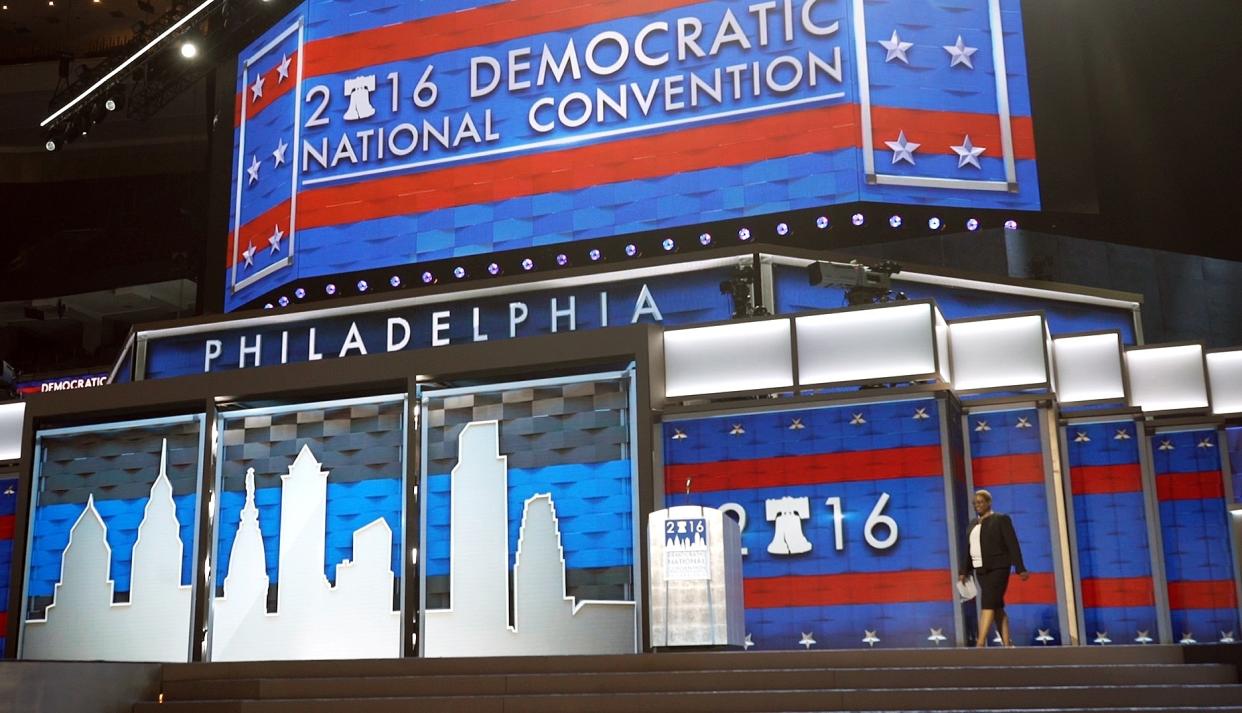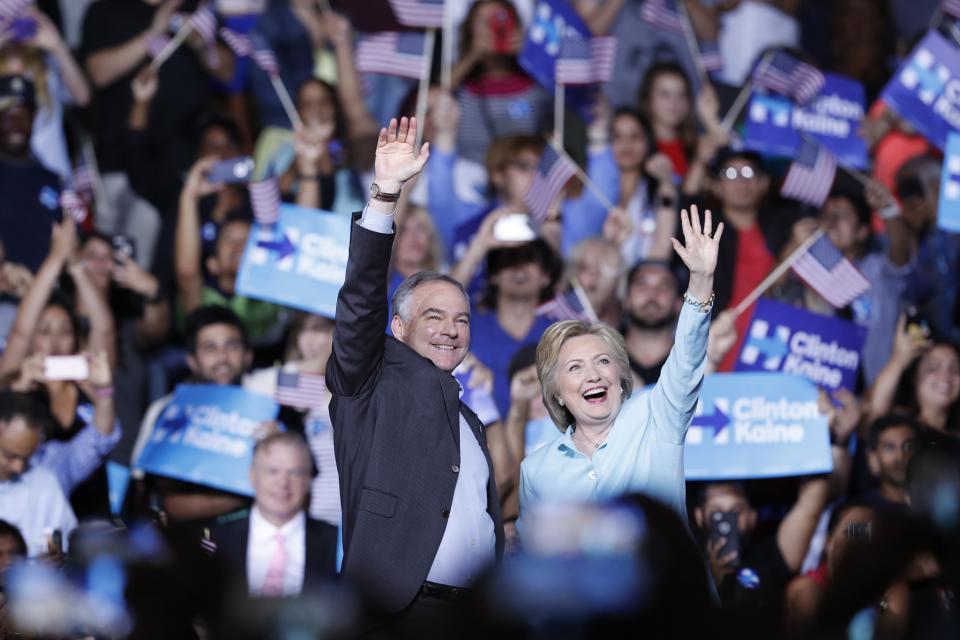Democratic convention to showcase unity, if it can find any

The Democrats were supposed to be the adults in the room. They were going to show unity. Their convention would be peaceful, even harmonious, with a sitting president and vice president joining hands with a former president, all of them pursuing the same goal: Elect Hillary Clinton as the 45th U.S. president. That, at least, was how some pundits and strategists had set expectations for the Democratic convention, which is kicking off today in the Wells Fargo Center in Philadelphia.
But wait: Hundreds of Bernie Sanders’ supporters are protesting in Philadelphia’s streets. And the surprise resignation of Democratic National Committee Chair Debbie Wasserman Schultz yesterday has raised prickly questions. Amid doubts among progressives about Tim Kaine as Hillary Clinton’s running mate, the stakes for the Democrats have risen, and the convention has become more consequential for Clinton’s election prospects.
The Democrats are going to need organization, skill, artful oratory — and some luck. In Cleveland last week, Republicans endured one of the most fractious conventions since 1964. Sen. Ted Cruz, the runner-up in the GOP primaries, urged people to “vote your conscience.” A speech by Donald Trump’s wife, Melania, plagiarized a chunk of Michelle Obama’s 2008 convention address. Even Ohio’s Gov. John Kasich, in whose state the convention occurred, was remarkably absent.
Polls are showing a tight contest between Donald Trump and Hillary Clinton. While conventions are not typically make-or-break moments for the nominee of either party, the Democratic convention will help determine whether the party can achieve unity, communicate a consistent message to the public, and begin to define progressivism for a post-Obama age.
Here, then, are five issues that viewers should consider as they watch the unfolding Democratic drama. These issues will help shape Hillary Clinton’s image and influence Democratic chances of winning the White House this fall.

1) Feeling the Bern: Now that Clinton has chosen Virginia Sen. Tim Kaine for the second slot, much is riding on Sanders’ primetime speech tonight. Will the Vermont Senator give a full-throated endorsement of Hillary Clinton? Or will his speech mostly be out of sync with the rest of the convention? His focus will help to determine how united the party is heading into the election in November. Will it be on the “rigged system,” with his trademark call to ignite a revolution? Or on Trump’s unfitness for office and Hillary Clinton’s progressive credentials?
During the 1980 Democratic convention, Sen. Ted Kennedy, who had mounted a primary challenge to the incumbent president, refused to be photographed with Jimmy Carter in a show of party unity at the podium. The image lingered. Twelve years later, Bill and Hillary Clinton delivered vigorous endorsements of then-Sen. Barack Obama at the 2008 Democratic convention. The former choice fostered disunity; the latter yielded harmony.
2) Fear: How will Democrats reply to the fear promulgated by Republicans in Cleveland? Will Democrats acknowledge that some Americans legitimately are afraid of crime, unchecked immigration, and homegrown radicalism? Will they focus on what’s wrong with America or mostly underscore what’s right with America? How Democrats counter Trump’s efforts to frame the election around law and order will presage their message and appeal to swing voters in the fall.
3) A Tale of Two Presidents: The GOP’s two living presidents, both named Bush, skipped last week’s convention. The same awkward problem won’t afflict the Democrats. Bill Clinton and Barack Obama, who are both delivering primetime addresses, bring with them both big rewards and some risks. Will Clinton or Obama make the case for Hillary Clinton better than she does herself? Bill Clinton delivered a robust defense of Obama’s record and the Democratic Party’s philosophy at the 2012 Democratic convention, framing the election in resonant terms. Both Bill Clinton and Obama will have the chance to remind voters why Democrats have held the White House for 16 of the past 24 years. The Clinton-Obama speeches may be among Hillary Clinton’s best opportunities to improve her damaged image.
4) Rebuilding Trust: Will Hillary Clinton confront her “trust deficit” head-on and ask voters to give her a second chance? Some two-thirds of registered voters say they don’t trust the presumptive Democratic nominee. Not long ago, she acknowledged contributing to the polarized state of partisan politics. But for voters to rethink their doubts about her honesty, Democrats probably need to do more than show gauzy biographical films about Clinton’s decades-long work with women and children. How Democrats discuss Hillary Clinton’s email woes, if they address them at all, could help offset her most critical weakness as a candidate, strengthening her chances in the fall.
5) “Lock Her Up”: Lastly, there’s tone. Trump’s convention made the GOP’s 2008 gathering — punctuated by raucous chants of “drill, baby, drill” — look positively elevated by comparison. Last week, delegates repeatedly chanted “Lock Her Up!” Will Democrats be tempted to denounce Trump in similarly shrill terms, aping Republicans’ foam-at-the-mouth attacks? Will the Democrats feature any shoutfests akin to New Jersey Gov. Chris Christie’s prosecutorial harangue (“Guilty!”), former New York Mayor Rudy Giuliani’s angry fear-mongering (“We’re coming to get you!”) and retired Gen. Michael Flynn’s put-her-in-stripes rant? The volume and tone of the Democrats’ speeches may shape how voters see the party’s ability to lead with cool heads and will determine whether Democrats are actually speaking in the spirit of Clinton’s slogan, Stronger Together.
In the wake of the DNC email revelations, the four days in Philly give Democrats their best shot at conveying a consistent message and an alternative to Trump’s declaration that Clinton’s legacy is “death, destruction, terrorism, and weakness.” Coming after a bitter Democratic primary that left some wounds unhealed, it’s unclear if the party can unite.
By Friday morning, we should have some answers.
Matthew Dallek, an associate professor at George Washington University’s Graduate School of Political Management, is author of Defenseless Under the Night: The Roosevelt Years and the Origins of Homeland Security.
_____
Related slideshow:
Demonstrators protest outside the DNC >>>


